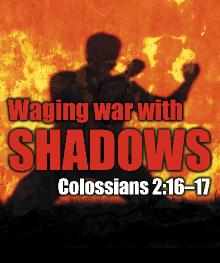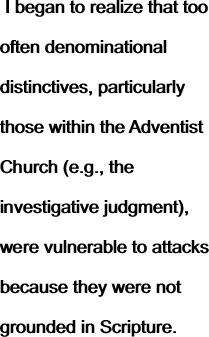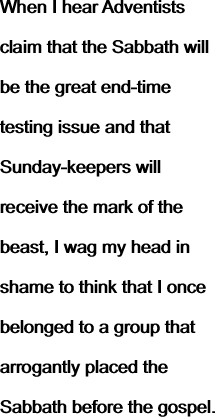 |
|
HOME | PROCLAMATION! MAGAZINE | DEVOTIONALS | STUDIES | LETTERS | ABOUT US | RELATED WEBSITES |
|
HOME / PROCLAMATION! MAGAZINE / 2008 / SEPTEMBER/OCTOBER / PALMER
SEPTEMBER / OCTOBER 2008
VOLUME 9, ISSUE 5
A R T I C L E S
Waging war with shadows (Colossians 2:16–17)
Dennis Palmer
"So let no one judge you in food or in drink, or regarding a festival or a new moon or Sabbaths, which are a shadow of things to come, but the substance is of Christ."
Tne last bastion remained before I could declare victory over the non-Sabbatarian perspective! For over thirty years I have been waging war against the non-Sabbatarians, and my exegetical battalions ceaselessly bombed the mighty fortress of Col. 2:16-17. They are all wiped out! Brave reinforcements were added and blasted away. I attended three leading seminaries,1 one university, and one Adventist institution, Union College, Lincoln, Nebraska, with the hope of finding the exegetical tools that would give me an understanding of Col. 2:16-17. Every time, however, the tables would be turned. I would graduate from an institution of higher learning with my Sabbatarian position severely weakened. Even while at Union College, I was devastated that my teachers did not have the exegetical answers to harmonize Col. 2:16-17 with a Sabbatarian perspective. Beaten, bombed, shelled, maimed, and defeated, I will write my war memoirs making mention of the five strategies I used in attempting to defeat the clear teaching of Col. 2:16-17.
Initial Strategy: Read "Sabbaths" as Annual Sabbaths
In 1972, while still in high school, I became a Sabbath-keeper despite resistance from family, friends, and teachers. I accepted the standard interpretation of the Adventist Church that the word "Sabbaths" in Col. 2:16 refers to annual Sabbaths. The argument was simplistic: the "Sabbaths" were those "which are a shadow of things to come" (Col. 2:17), i.e., the annual Sabbaths.2 The weekly Sabbaths were not shadows and therefore Paul could not have been referring to these Sabbaths. I reasoned that Col. 2:16-17 should be harmonized with my understanding of all the other Sabbath references. Hence, I superimposed the seventh-day Sabbath perspective upon the text rather than jettison my Sabbatarian belief.
The appeal to the analogy of Scripture, however, seemed weak to me because there were military posts along the way that did not support the advancing Sabbatarian position. These military posts seemed less fortified (Romans 14; Gal. 4:9-10; Eph. 2:15). I reasoned that if I could kill the exegetical arguments in Col. 2:16 as presented by the anti-Sabbatarian brigades, I could send in exegetical tactical units that would storm these last outposts (Romans 14; Gal. 4:9-10; Eph. 2:15) giving the Sabbatarian platoon a decisive victory over what I then believed were the forces of darkness.
My euphoria began to crack when I read Samuele Bacchiocchi's From Sabbath to Sunday. Even though Bacchiocchi was attempting to defend the Sabbatarian position from a historical perspective, friendly fire from his regiment wounded my defense of the Sabbath. He pointed out that the logical progression of "annual, monthly, and weekly" sacred times was backed up by similar sequences in the Old Testament.3 Furthermore, Col. 2:16 would contain a "needless repetition" if "Sabbaths" referred to annual Sabbaths because the word "festival" has reference to the annual Sabbaths.4 Eight times the Old Testament groups together festivals (usually called "feasts"), new moons, and Sabbaths (1 Chron. 23:31; 2 Chron. 2:4; 8:13; 31:3; Neh. 10:33; Is. 1:13; Ezek. 45:17; Hosea 2:11). Each time it is plain that the Bible is speaking of the annual, monthly, and weekly sacred times. The "feasts" within the enumeration always refer to the annual Sabbaths, and the word "Sabbaths" within that context refers to the weekly Sabbath. Sometimes the sequence is reversed (weekly, monthly, and yearly, e.g., 1 Chron. 23:31; 2 Chron. 2:4; 8:13; 31:3; Neh. 10:33; Is. 1:13). Two enumerations are close parallels to Col. 4:16 and follow yearly, monthly, and weekly pattern:
Then it shall be the prince's part to give burnt offerings, grain offerings, and drink offering, at the feasts, the New Moons, and Sabbaths, and at all the appointed seasons of the house of Israel (Ezek. 45:17).
I will also cause all her mirth to cease, her feast days, her New Moons, her Sabbaths—all her appointed feasts (Hosea 2:11).
The triple sequence of festivals, New Moons, and Sabbaths is a summary of all sacred times.
This is obvious from the summations made in the above texts, e.g., "all her appointed feasts" (Hosea 2:11). This summation of all of Israel's sacred times is obviously in the triple sequence in Col. 2:16. Therefore, the word "Sabbaths" in Col. 2:16 cannot be reinterpreted as annual Sabbaths because to do so would eradicate the summary nature of the phrase "festival, new moons, and Sabbaths." Thus, the "Sabbaths" in Col. 2:16 are weekly Sabbaths.
With this tragic defeat, I began to realize that too often denominational distinctives, particularly those within the Adventist Church (e.g., the investigative judgment), were vulnerable to attacks because they were not grounded in Scripture. Denominational leaders often have a theological agenda, and they form their conclusion before doing an inductive study of the text. Their purpose, unfortunately, is often to support the teaching of their church enough to stay within the comfort zone of the denomination. Too often in doing theology they will make a downward exegetical spiral in trying to arrive at a difficult doctrinal distinctive. Early in my college life, I decided I would not take this dishonest exegetical route. I figured somehow I could exegetically justify my traditional Sabbatarian position, but the results were thirty years of wandering in the exegetical wilderness.
Desperate Strategy: See the "Shadow" as a Positive New Testament Feature
In despair, I fell back on Bacchiocchi's view "that the Sabbath can legitimately be regarded as the 'shadow' or fitting symbol of the present and future blessing of salvation."5 I could see plainly from Col. 2:16-17 that the Sabbath is a shadow of grace. It is not the means of grace, but has the qualities of a shadow, viz., it "stands for the dim representation of the real things."6 Hebrews 4:1-11 shows that the Sabbath foreshadows a spiritual rest that is in Christ. However, what bothered me and did not seem to trouble Bacchiocchi was the notion that by designating the Sabbath a "shadow" I was inherently classifying the Sabbath with the other ceremonial observances. The implications from Heb. 8:5; 10:1 is that a "shadow" is an Old Testament ritual that has its fulfillment in Christ, and consequently the ritual aspect is no longer obligatory. How could I say that the New Moons and annual Sabbaths are shadows and thus no longer mandated while at the same time holding that the seventh-day Sabbaths are shadows that are a mandate for all of humanity? The inconsistency was driving me senseless, and so I added another spin to my interpretation of the text.
Defense Strategy: Redefine the Greek word Translated "Judge" to "Condemn"
As a Sabbatarian, I found it hard not to pass judgment on others who, in my mind, were overtly breaking the Sabbath. I reasoned that if they really had a close relationship with God, they would keep the Sabbath. While driving over a toll bridge on the Sabbath, I inferred, "If these people would stop working on Sabbath, I would not have to pay to get to church or put up with all this traffic." I blamed my problems on non-Sabbatarians, and in doing so, I was passing judgment upon them. In some ways I saw them as less spiritual for I believed that they were constantly sinning on the Sabbath by refusing to keep the day. Little did I realize that I was sinning every time I passed judgment on my brothers and sisters in Christ for not observing the Sabbath.
When I found out that Col. 2:16 referred to the weekly Sabbath, I became less judgmental of the Sabbath or non-Sabbath-keeping practices of others. However, there was still a covert operation of passing judgment in my heart. I was obviously participating in Sabbath evangelism, and in order to do so, I had to pass judgment that observing the seventh-day Sabbath was better than observing Sunday. In order to justify this slight degree of judgment, I attempted to read the Greek word that is normally translated "judge" (krivnw) in Col. 2:16 as "condemn." Hence, the translation, "So let no one condemn (krinevtw) you in food or in drink, or regarding a festival or a new moon or Sabbaths." I tried to substantiate this reading because elsewhere in the New Testament (John 3:17-18; Rom. 14:22) this word is translated "condemn." However, in the vast majority of cases, this word is translated "judge" (Matt. 7:1; 19:28; Rom. 2:1, 3, 12; 1 Cor. 4:5; 5:3, 12; James 2:12; 1 Peter 1:17; 2:23; Rev. 6:10). Furthermore, the translation "condemn" in Col. 2:16 does not fit the context, for who goes about condemning others for their particular Sabbath practices? This would obviously be a very harsh judgment. Furthermore, it does not solve the most troublesome part of the text that says the Sabbath is "a shadow of things to come" (Col. 2:17).
Had I understood the radical nature of the old covenant and the newness of the new covenant, I would have seen a contrast between Num. 15:32-36 (the story of the man who was stoned for gathering sticks on the Sabbath) and Col. 2:17. The death penalty attached to the Mosaic covenant calls for the passing of judgment on overt acts that violated the Sabbath (Ex. 31:15). The newness of the new covenant says, "Do not pass judgment on those who do not observe the Sabbath."
Offensive Strategy: Ambushing and Outmaneuvering My Non-Sabbatarian Opponent
In reexamining Col. 2:16-17, I sought to ambush my non-Sabbatarian opponent. My strategy was to show that the pronoun "which" refers to anything but the Sabbath. I almost succeeded in my efforts. I made a tentative translation of Col. 2:16-17: "Therefore, do not let anyone judge you in meat (offerings) and in drink (offerings), either in respect of a festival, or a new moon, or Sabbaths, which things [that is, the sacrifices] are a shadow of things coming, but the body (is) of Christ." I concluded that the two words brwvsei and povsei refer to the meat and drink offerings in the Old Testament. This decision was made based on the premise that Hebrews 9:10 (cf., Ezek. 45:17) uses both words together in connection with sacrifices. However, the pros and cons of this part of my interpretation of Col. 2:16 are beyond the scope of this article, and whatever viewpoint one adopts has little to do with the settling of the Sabbath issue.7
Unwittingly I made the relative pronoun ("which") refer only to the first half of Col. 2:6: "Therefore, do not let anyone judge you in meat (offerings) and in drink (offerings)." I had ambushed that part of the brigade allowing for the Sabbath troops to be set free from the stinging attack that the pronoun ("which") was making on the seventh-day Sabbath. This interpretation freed the "Sabbath" from an ignoble connection with the bygone shadows. In order to remain a Sabbath keeper, I felt I had to disassociate the Sabbath from the shadows because Heb. 8:5; 10:1 uses "shadow" as a reference to the tabernacle and its prescribed rituals. In many ways, I was thinking just like Frank B. Holbrook: "The apostle is not attempting to classify all elements of the sanctuary worship as shadows….Paul's argument is that the sanctuary system—as a system—was 'a shadow of things to come.' "8 However, God did not give me any peace with this interpretation. I first realized that the gender and number of the pronoun "which" was neuter plural as also was the word savbbatwn. The pronoun was in agreement with the near antecedent, "Sabbaths." The pronoun is not in agreement with brwvsei and povsei (Col. 2:16a) which are both singular in number and feminine in gender. The most logical conclusion is that the relative pronoun refers definitely to the Sabbath including also the whole series of Jewish sacred times and the possible reference to meat and drink sacrifices. I was humiliated and completely defeated. For years I lived in utter hermeneutical chaos until I discovered the wonderful news of the new covenant as the solution to the Sabbath dilemma. My Sabbatarian position was a shattered pot, but the Lord put together those pieces in my life and now my theology is stronger and truer to the Word of God.
Final Strategy: Define Sabbath as the Gnostic Sabbath
A widely held view of scholars is that the philosophy of "empty deceit, according to the tradition of men, according to the basic principles of the world, and not according to Christ" (Col. 2:8; cf., 2:18-23) is an incipient Gnosticism consisting of a fusion of ancient mysticism, Hellenistic speculation, and an old covenant Jewish mentality. Any material substance including the body was deemed as evil, and the all-spirit god was seen as totally apart from the material universe. This philosophy flowered during the second century. Although the entire movement is so amorphous that it is difficult to describe, one major strand of Gnosticism claimed that a long series of hierarchical emanations called "aeons" descended from an all-moral, spirit god. These "aeons" were known as angels, and the nearest one to God was the most pure, and the others were progressively inferior. Somewhere alone the string of "aeons" was Christ who is regarded as a subordinate being known as a "Demiurge."
With this background, I knew that I could convince others that the word "Sabbaths" (Col. 2:16-17) referred to the Gnostic Sabbath, and therefore had nothing to do with the biblical Sabbath. However, I was not swayed by the scholarly arguments put forth that "Sabbaths" in Col. 2:16 were Gnostic. The principal reason is that "Sabbaths" are defined as bygone shadows: "Which are a shadow of things to come, but the substance is of Christ" (2:17). If Paul were writing against Gnostic sabbaths, he surely would not call them "shadows." How could the Gnostic sabbaths be seen as a Jewish shadow revealing Christ? To call them shadows would be to blend a wonderful Jewish symbol with a pagan Gnostic day of observance.
The attempts to redefine the "Sabbaths" in Col. 2:16 as Gnostic sabbaths are precarious. Samuele Bacchiocchi sees the "Sabbaths" in Col. 2:16 as days for the "veneration of 'the elements of the universe.' "9 He argues that this type of homage would "affect the observance of the Sabbath and of sacred times, since it was commonly believed that the astral powers, which direct the stars control both the calendar and human lives."10
The purpose of the Sabbath would be changed if Paul were speaking of a Gnostic sabbath in Col. 2:16. However, Bacchiocchi's view is an argument from silence. The Bible never explicitly states that the Sabbath is being observed in honor of the elements of the universe. The phrase, "festival or a new moon or Sabbaths" (2:16), sets the Sabbath among other Jewish festivals, and as we have previously noted, the phrase is nearly frozen for those festival days are used in that order or at least together in the Old Testament. If Paul were introducing a new type of Sabbath that he wanted Christians to refrain from observing, he would not likely lump it together with the other Jewish holy days.
If the "Sabbaths" in Col. 2:16 were Gnostic Sabbaths, then there would be a Sabbath to celebrate the creation of a material universe. The Gnostics abhorred the idea of creation. They held that God did not create the universe and is remote from it. One might argue the reverse, that the Gnostics (especially in the second century) did not observe the Sabbath because it was a celebration of God's creation. Gnostics and people influenced by that philosophy may have been attracted to the observance of the first day of the week because of the Gnostic idea that the material world is evil. However, this perspective is not known from the Scriptures, and Paul's advice is not to dispute over whether one observes or doesn't observe the Sabbath (Rom. 14:5-6).
There is probably some link between the observance of Sabbath and the philosophy in Colossians which is commonly seen as the beginning stages of Gnosticism. However, the link is not as strong as Bacchiocchi makes it out to be. The Jewish component to the philosophy of incipient Gnosticism was that out of a love for asceticism some Gnostics observed Jewish rituals such as festivals, Sabbaths, circumcision (Gal. 2:11-12), rabbinical regulations (2:9, 21), dietary measures (2:16, 21), and extreme forms of fasting whereby the body was neglected (2:23). The possible observance of the Sabbath by Gnostics does not inherently change the character of the Sabbath that was instituted by God. Since the "Sabbaths" are treated as Jewish in Col. 2:16, it is better to see the deviant philosophy in Colossians as the embracement of the Jewish Sabbath rather than its complete distortion. Although some Gnostics may have distorted the Sabbath, Paul treats the Sabbath in Col. 2:16 as the Jewish Sabbath. We therefore have no grounds to contend that Paul is simply saying, "Let no man judge you about not observing the Gnostic Sabbath."11
To counter the Colossian heresy, Paul emphasized that Christ is all-sufficient and that Christians are "complete in Him." (Col. 2:10). In many ways, my attempt to make the Sabbath a universal obligation was a subtle way of saying that Christ was not sufficient. Christ had fulfilled the Sabbath through his death on the cross, but I was blinded to the full implications of that salvific act. When I hear Adventists claim that the Sabbath will be the great end-time testing issue and that Sunday-keepers will receive the mark of the beast, I wag my head in shame to think that I once belonged to a group that arrogantly placed the Sabbath before the gospel.
Conclusion: A Eulogy
Acknowledging God's sovereignty, I have laid to rest these five inadequate interpretations of Col. 2:16-17. The center of the text is Christ. He is our Sabbath rest, and He has divinely fulfilled the Sabbath, a symbol of our eternal rest. Sabbath observance had its place in the old dispensation, but now under the new covenant the observance of the weekly Sabbath is no longer prescribed. We are not to pass judgment upon those who do not keep the Sabbath. This is the clear teaching of Col. 2:16-17 that is reiterated in Rom. 14:4-13, but for 30 years I have battled against this obvious conclusion. I have lost that battle!
Now is fallen the Sabbatarian position. Crowned with earthly laurels, his body lies softly in the battle field. The sky shines bright on his blue vestment. He is the fallen hero to all who love to live under the law. But a faded glory is the Sabbath, in the radiance of the new covenant, "a shadow of things to come" (Col. 2:17). †
Endnotes
- The graduate schools I attended are as follows: Southwestern Baptist Theological Seminary (M. Div.), Westminster Theological Seminary (Th. M.), and Biblical Theological Seminary (S.T.M.). I also graduated from San Jose State University (M.L.I.S.) in 1996.
- Unless stated otherwise, all Scripture references are from the New King James Version.
- S. Bacchiocchi, From Sabbath to Sunday: A Historical investigation of the Rise of Sunday Observance in Early Christianity (Rome: Pontifical Gregorian University Press, 1977), 358-59.
- Ibid., 60.
- Ibid., 359.
- S. J. Kistemaker, "Exposition of the Epistle to the Hebrews," in Thessalonians, the Pastorals, and Hebrews, New Testament Commentary, W. Hendrikson and S. Kistemaker (Grand Rapids: Baker, 1984): 272.
- The traditional interpretation is built on the assumption that the phrase, "in food or in drink" (Col. 2:16) refers to Jewish ascetic practices. However, the Mosaic Law had few restrictions with regard to drink. A person who took the vow of a Nazarite would separate himself or herself from intoxicating drink, vinegar, or any food or drink made from grapes (Num. 6:3). Drinking vessels and what is in them would become unclean if they came into contact with an animal that dies (Lev. 11:31-34). Furthermore, there are prohibitions against the use of intoxicating drink especially for the priests who ministered in the tabernacle (Lev. 10:9). The latter restriction applies also to elders and deacons (1 Tim. 3:2-3; Titus 2:2-3), and all Christians are to remain sober at all times (Eph. 5:18; Gal. 5:21). Paul is certainly not saying to avoid passing judgment upon a situation where heavy drinking is taking place. Paul is not telling fathers and mothers not to be concerned if your teenager is drinking!
- F. Holbrook, "Did the Apostle Paul Abolish the Sabbath?: Colossians 2:14-17 Revisited," Journal of the Adventist Theological Society 13 (Autumn 2002), 71.
- Bacchiocchi, From Sabbath to Sunday, 361.
- Ibid.
![]()
Copyright 2008 Life Assurance Ministries, Inc., Glendale, Arizona, USA. All rights reserved. Revised October 26, 2008. Contact email: proclamation@gmail.com

 Dennis Palmer grew up in the Christian Church but converted to Adventism in his teens. He attended Union College, a Seventh-day Adventist school in Lincoln Nebraska, where he majored in theology. In 1978, just before he graduated from Union College, he became a Seventh Day Baptist. He is currently the pastor of the Seventh Day Baptist Church in Lake Elsinore, California. Dennis has notified his denominational leaders that he has plans to leave the denomination because of his conviction that the New Testament teaches that Sabbath rest is found and fulfilled in Jesus.
Dennis Palmer grew up in the Christian Church but converted to Adventism in his teens. He attended Union College, a Seventh-day Adventist school in Lincoln Nebraska, where he majored in theology. In 1978, just before he graduated from Union College, he became a Seventh Day Baptist. He is currently the pastor of the Seventh Day Baptist Church in Lake Elsinore, California. Dennis has notified his denominational leaders that he has plans to leave the denomination because of his conviction that the New Testament teaches that Sabbath rest is found and fulfilled in Jesus.

